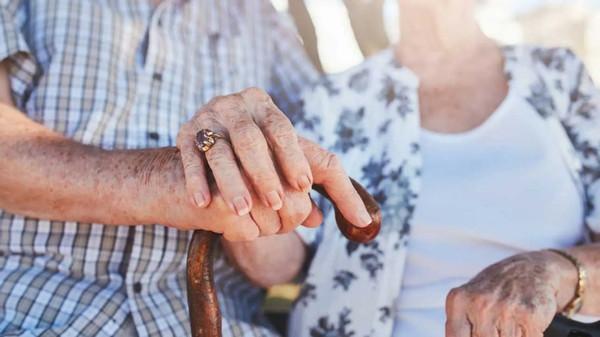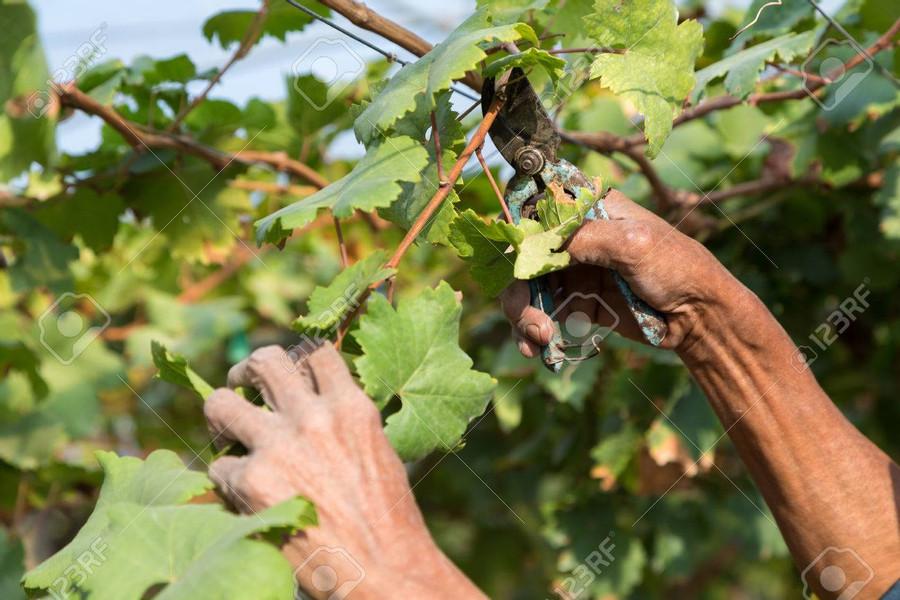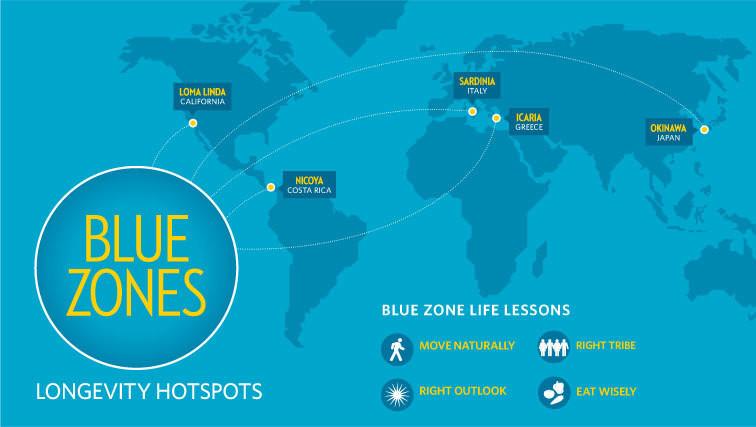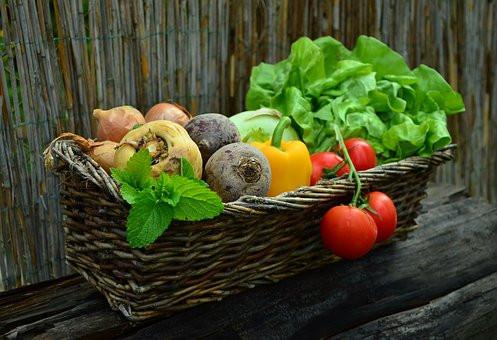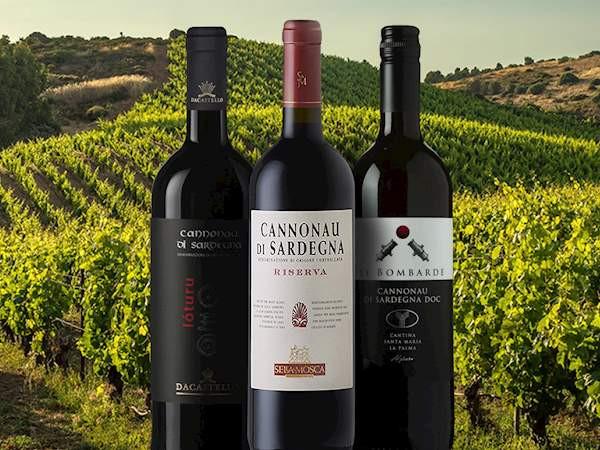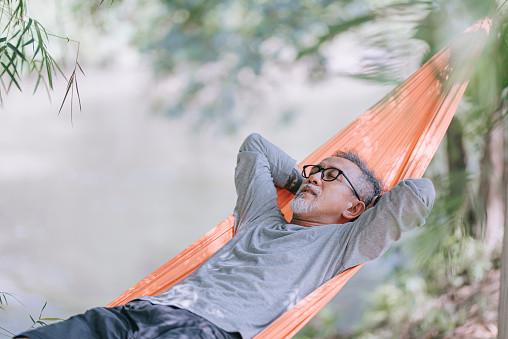Explore the World's Best Ideas
Join today and uncover 100+ curated journeys from 50+ topics. Unlock access to our mobile app with extensive features.
Blue Zones definition
Blue Zones refer to geographic areas in which people have low rates of chronic disease and live exceptionally long lives.
They are called Blue Zones because author Dan Buettner, who was studying areas of the world where people live very long lives, drew blue circles around these areas on the map.
69
1.1K reads
The five known Blue Zones
- Icaria (Greece): These people eat a Mediterranean diet rich in olive oil, red wine and homegrown vegetables.
- Ogliastra, Sardinia (Italy): Some of the oldest men in the world live here. They commonly work on farms and drink lots of red wine.
- Okinawa (Japan): You can find the world's oldest women here. They eat soy-based foods and practice tai chi, a meditative form of exercise.
- Nicoya Peninsula (Costa Rica): The Nicoya people regularly do physical jobs into old age. Their diet includes beans and corn tortillas.
- The Seventh-day Adventists in Loma Linda, California. They are strict vegetarians.
93
1.09K reads
People who live in Blue Zones eat a 95% plant-based diet
Most groups are not strict vegetarians but eat meat about five times per month.
Diets include:
- Vegetables, which is a great source of fibre, minerals and vitamins.
- Legumes include beans, peas, lentils and chickpeas, which are all rich in fibre and protein.
- Whole grains, which are rich in fibre.
- Nuts: Nuts are great sources of fibre, protein and polyunsaturated and monounsaturated fats.
Other dietary factors for Icaria and Sardinia are eating fish regularly. Fish is a good source of omega-3 fats.
82
906 reads
They fast and follow the 80% rule
Calorie restriction
Eating fewer calories may be contributing to the longer lives in some of the Blue Zones.
- Studies found that Okinawans were in a calorie deficit before the 1960s, which may contribute to their longevity.
- Okinawans tend to follow the 80% rule, which they call “Hara Hachi bu.” It means they stop eating when they feel 80% full, rather than 100% full.
Fasting
Icarians are typically Greek Orthodox Christians that have many periods of fasting for religious holidays throughout the year.
- A study showed that fasting led to lower blood cholesterol and body mass index (BMI).
79
888 reads
They consume alcohol in moderation
People in some Blue Zones drink one to two glasses of red wine per day, which may help prevent heart disease and reduce the risk of death.
Sardinian Cannonau wine, which is made from Grenache grapes, has been shown to have extremely high levels of antioxidants, compared to other wines. Antioxidants help prevent damage to DNA that can contribute to ageing.
76
840 reads
Exercise is built into daily life
People in the Blue Zones don't exercise purposefully by going to the gym. Instead, they are active through gardening, walking, cooking and other daily chores.
A study of men in the Sardinian Blue Zone found that their longer life was associated with raising farm animals, living on steeper slopes in the mountains and walking long distances to work.
74
875 reads
They get enough sleep
People in Blue Zones get sufficient sleep and also often take daytime naps.
Studies found that not getting enough sleep or too much sleep can increase the risk of death, including heart disease or stroke.
Blue Zone people tend to sleep as much as their body tells them to. Daytime napping of 30 minutes or less is also common.
72
799 reads
Other traits and habits associated with longevity
- Being religious or spiritual: Blue Zones are typically religious communities. Several studies have shown that being religious is associated with a lower risk of death.
- Having a life purpose: People in Blue Zones tend to have a life purpose, known as “ikigai” in Okinawa or “plan de vida” in Nicoya
- Older and younger people living together: In many Blue Zones, grandparents often live with their families.
- A healthy social network: Your social network, called “moai” in Okinawa, can affect your health. If your friends are obese, social acceptance leads you to have a greater risk of being obese.
73
823 reads
IDEAS CURATED BY
Emily Q.'s ideas are part of this journey:
Learn more about food with this collection
The importance of physical activity
The role of genetics in lifespan
How to maintain a healthy diet
Related collections
Similar ideas
17 ideas
The Blue Zones Solution Summary
fourminutebooks.com
1 idea
8 Effective Tips to Lose Fat in Your Face
healthline.com
8 ideas
8 Health Benefits of Fasting, Backed by Science
healthline.com
Read & Learn
20x Faster
without
deepstash
with
deepstash
with
deepstash
Personalized microlearning
—
100+ Learning Journeys
—
Access to 200,000+ ideas
—
Access to the mobile app
—
Unlimited idea saving
—
—
Unlimited history
—
—
Unlimited listening to ideas
—
—
Downloading & offline access
—
—
Supercharge your mind with one idea per day
Enter your email and spend 1 minute every day to learn something new.
I agree to receive email updates
